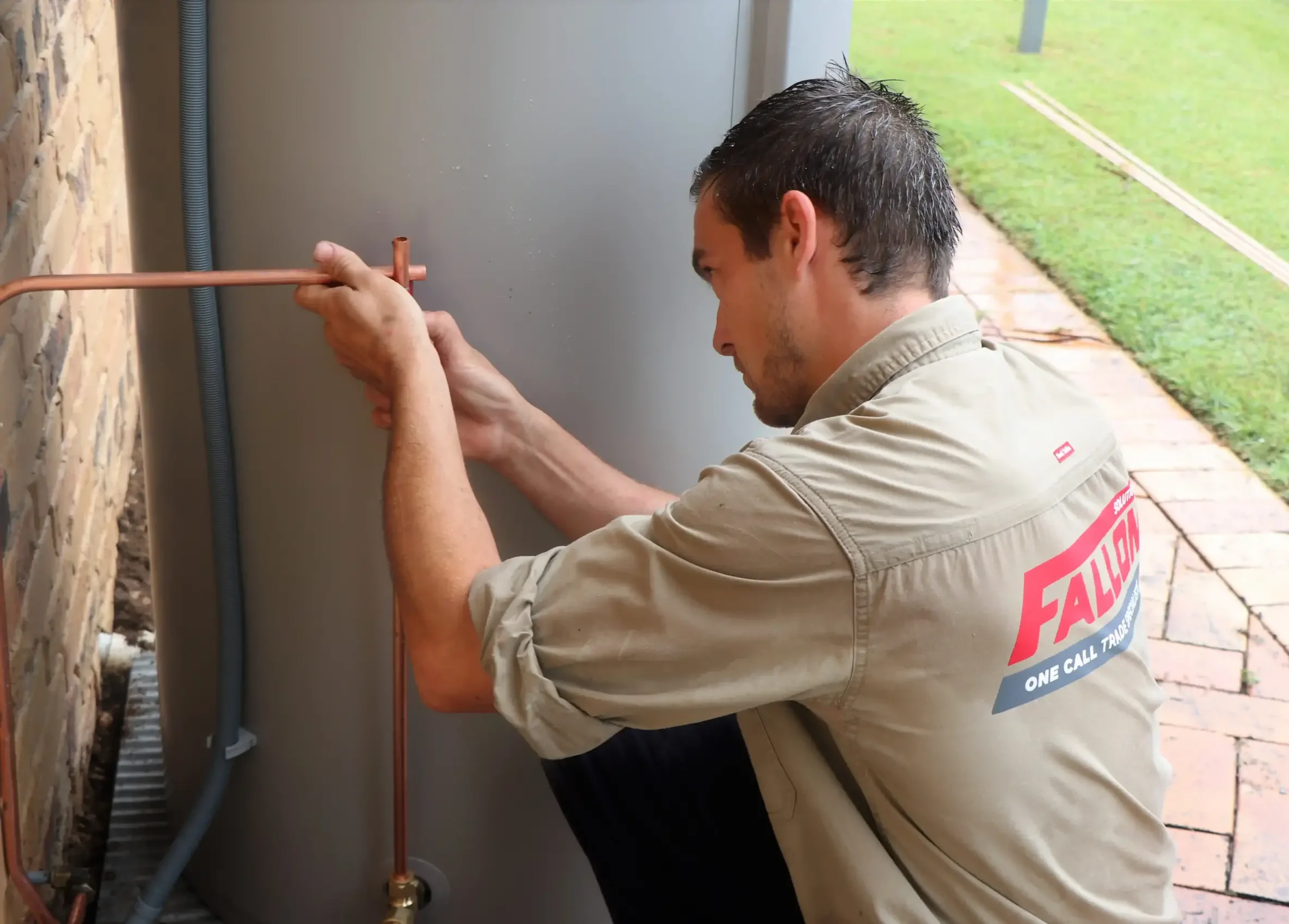GUARANTEED HOT WATER TODAY OR $100* OFF | T&Cs Apply, See Below
Understanding Your Hot Water System
Having hot water in your home or business really is a big aspect we all take for granted, especially stepping into a warm shower or bath after a long day. But, have you ever really considered how your hot water system works, what it does and how it functions all year round?
Granted it likely isn’t something you’d speak about with your friends at a dinner party, but it is an important aspect to consider especially if you are looking to upgrade or replace your current system. We have therefore put together some information regarding the different kinds of hot water system, their advantages, disadvantages and brands which manufacture each kind of system. If you have any questions regarding anything in this article, give Fallon Solutions a call on 1300 054 488.
A few hot water facts:
According to the Australian Government:
- Water heating is the largest source of greenhouse gas emissions from the average Australian home.
- Water heating uses the second-largest amount of energy in households, behind space heating and cooling.
- Water heating accounts for about 21-25% of energy used in the home but generates about 23% of the greenhouse gas emissions.
- Around 50% of Australians use electric water heaters, but this contributes to around 80% of hot water greenhouse gas emissions.
- Around 50% of the water used in the home is used in the bathroom, around 1/3 in the laundry and then the remainder is used in the kitchen.
- Electric storage hot water heaters are the most commonly chosen systems in Australia.
Types of Hot Water Systems
There are two main types of hot water heaters:
- Storage systems: Store hot water in an insulated tank until needed.
- Continuous Flow systems: Otherwise known as instantaneous systems, which heat hot water as and when needed.
Need a Hot Water specialist?

Call us on 1300 054 488
We Can Be There Today!

Send us an Enquiry Online
We’ll get back to you asap!
Storage Systems
Advantages of storage hot water systems:
- Common choice, especially for electric hot water.
- Usually come with 5-10 year warranties.
- Usually contain 1-2 sacrificial anodes, which draw away nasties that corrode tanks.
- Stainless steel tanks last for a long time and require little maintenance.
Disadvantages of storage hot water systems:
- Mild-steel storage tanks can corrode, however regular maintenance can address this.
- Heat loss over time, so always install in a sunny area where possible.
- Local water quality can decide which tank is best – you may not have to!
- Stainless steel tanks are expensive.
Continuous Flow Systems
Advantages of continuous flow hot water systems:
- Cheaper to run than storage systems.
- No heat is lost like in storage tanks.
- Water is heated as needed, so do not run out.
- Only heat the amount of water that is going to be used.
Disadvantages of continuous flow hot water systems:
- Not actually instantaneous – take a few moments for the water to heat up.
- Electric models use the full electricity tariff whenever they are in use, so running costs may be higher than for an off-peak tank, but less than a continuous tank system.
- Continuous flow water heaters may not turn on because of a combination of low flow shower heads and too high a trigger point for the hot water heater to start up.
These systems can be powered by a few different types of energy sources, otherwise known as services.
Types of Hot Water Service
There are 4 main hot water service types available in Australia:
- Electric Hot Water: Available in both storage and continuous flow systems.
- Solar Hot Water: Available in either gas (LPG or natural) boosted or electric boosted.
- Gas Hot Water: Either LPG or natural gas, in either storage or instantaneous systems.
- Heat Pump Hot Water
Advantages and Disadvantages of Different Hot Water Types
So, now we’ve covered the different types of systems, what are their benefits (and deficits)? It is worth noting that each option is suitable for different needs, so if you are unsure, it is best to speak to one of our local hot water specialist on 1300 054 488.
Advantages and Disadvantages of Electric Hot Water:
Advantages:
- Low upfront costs, including purchase and installation.
- Easy to install.
- Reliable.
- Heat in off-peak times is more cost-effective.
- Can install either inside or outside, as do not require a flue.
Disadvantages:
- Generally expensive long-term.
- Higher greenhouse gas emissions if not powered by a renewable energy source.
- If run on off-peak timing, a larger tank is required in order to store water for a whole day’s worth of usage.
Advantages and Disadvantages of Solar Hot Water:
Advantages:
- Can reduce your hot water system’s energy consumption by up to 90%.
- Very environmentally friendly.
- May be available for rebates or other government incentives.
- Will pay for itself in time, due to low running costs.
- Booster options are available to assist on overcast days.
Disadvantages:
- Large upfront costs.
- Can be unreliable on overcast days.
- Time-consuming to install.
Advantages and Disadvantages of Gas Hot Water:
Advantages:
- Cheap to run if you already have the connection (cheaper than electricity!).
- Gas rates do not vary throughout the day.
- More cost-effective than other options.
- Energy-efficient.
- Fewer greenhouse gas emissions.
Disadvantages:
- LPG costs can be quite higher, especially compared to natural gas.
- Electric ignition, although more economical, means no hot water in a blackout.
- Only really viable if already connected to mains gas.
- Must be located outside or if inside, must have a flue.
Advantages and Disadvantages of Heat Pump Hot Water:
Advantages:
- Much more efficient electric option.
- Government rebates and incentives may be offered.
- One of the most energy-efficient options available.
- Booster options are available to assist on cold days or high demand times.
Disadvantages:
- Usually installed outside, as need a well ventilated area.
- The compressor can be noisy.
- Only suitable in warm climates.
- Can be unreliable.
- High servicing costs.
Resources:
Energy Rating (Water Heating): http://www.energyrating.gov.au/products/water-heaters
YourHome (Hot Water Service): http://www.yourhome.gov.au/energy/hot-water-service
CHOICE (How to buy the best hot water system): https://www.choice.com.au/home-improvement/water/hot-water-systems/buying-guides/hot-water-systems
Canstar Blue (Hot Water Systems Compared): https://www.canstarblue.com.au/hot-water-systems/
Hot Water System Brands
There are a huge array of brands that produce all different hot water system types. They include:
Rheem Hot Water: Known for electric storage hot water, however, they also manufacture gas, heat pumps and instantaneous systems.
Aquamax Hot Water: Gas, electric and solar hot water system providers.
Bosch Hot Water: Provide instantaneous gas hot water heaters.
Rinnai Hot Water: Known for gas (including instantaneous), electric and solar hot water systems.
Thermann Hot Water: Known for electric, gas, continuous flow, and heat pump systems.
Vulcan Hot Water: Known for gas and electric hot water systems.
Quantum Hot Water: Provide renewable hot water systems using heat pumps.
Apricus Hot Water: Solar hot water provider.
Fallon Solutions Hot Water Plumbers
Same-day Service: Our plumbers are available across Greater Brisbane, the Gold Coast and the Sunshine Coast so you never have to look far for our trusted technicians.
24/7 Emergency Hot Water Plumbing Service: We are proud to offer emergency plumbing to residents of Greater Brisbane.
Excellent Customer Service: With thousands of 5-star reviews, we know the importance of quality customer service. Let us guide you through hot water installation, repairs and services.
Highly Qualified & Knowledgable Hot Water Plumbers: Our team of hot water specialists are experts in their field. With up-to-date qualifications, insurance and extensive knowledge.
We aim to provide you with fast, reliable service with minimal impact to your day. Contact Fallon Solutions on 1300 054 488 or complete our online booking enquiry here.
Trusted by over 7,600 reviewers on Google.
Rated 4.6 stars from more than 7,600 reviews in Brisbane
Terms and Conditions
- Offer must be mentioned when booking.
- Domestic offer only.
- Offer not applicable to travel fees.
- Can be used with membership pricing.
- The homeowner must be present.
- Offer is not redeemable for cash.
- Booking calls must be made between 7am and 1pm, Monday to Friday, on normal business days.
- Membership loyalty cards cannot be used as payment for any $100 offer.
- Contact our office for full details of all offers. Not applicable with any other offer.



